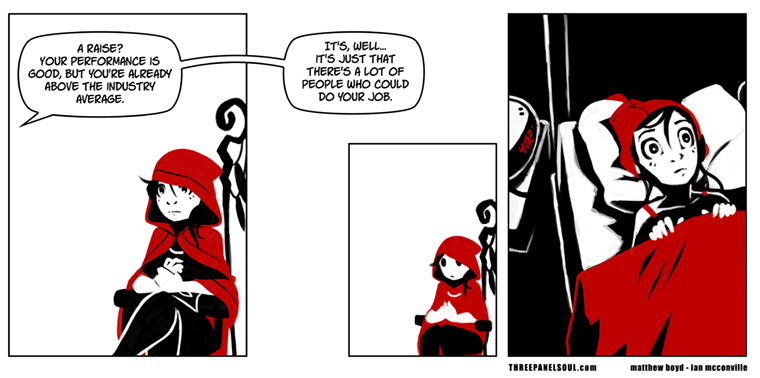Three Panel Soul was created by Matthew Boyd and Ian McConville, the same team behind the classic webcomic Mac Hall, which ended in 2006. It's a natural transition, as Mac Hall was about a group of slackers getting through college, and Three Panel Soul is about the life after. The somewhat-autobiographical slice-of-life webcomic ruminates on careers in the software industry, families, and soul-crushing existential crises.
The structure follows the limits of its title: Every strip is three panels, no more, no less. Its artwork is dominated by shadows: Three Panel Soul is heavy on the inks (there are exceptions, and they're typically spectacularly rendered and exclusive to video game gags). The use of negative space gives the webcomic a contemplative quality, reflective of the isolation of the soul. Characters sometimes seem tiny and insignificant when they're drawn against the vast emptiness around them. It's as if Boyd and McConville feel the suffocating grip of a life where you're too old to change but too young to be completely obsolete.
Let me recount one of the comic's most poignant strips. The first two panels are rendered in the colorful, super-deformed anime style of the original Mac Hall. A younger, snider Matt expresses his disdain at older students: "Every class has one dude over 30 who thinks his 'world experience' means everyone else needs to hear the dumb long-winded opinions of someone who's too old to think." Then we get to the final panel, rendered in the modern black and white; Matt is now that 30-year-old, going back to class to escape the clutches of the software industry, and eating his own words. It's haunting and a little depressing ... but it's also morbidly funny since readers of a certain age all sadly been there.
It's a turn for maturity that seems to go hand in hand with age. Despite being about slackers, Mac Hall's style bristled with the enthusiastic energy of youth. Even earlier strips of Three Panel Soul had cute animals tossing grenades in a silly commentary about gardening.
The comic, though, seems to have taken a turn for the sober: Ian marries the equally geeky Jes, and they move to Ohio, leaving Matt alone in San Francisco. Distance makes communications a little difficult, and the two friends find bonding time while they play coop games. Ian's adventures now revolve around raising his child, but they still touch upon the geeky; for instance, in one strip he explains why you shouldn't tell other parents their kid looks like MODOK. (Surprisingly, other couples get that reference? I'd think that might be a little too insider for most ... while actual comic book geeks who get it would be more than a little amused.)
Matt's story, meanwhile centers on the uncertainty of his career, and he contemplates layoffs and the threat of being replaced by younger workers. Workplace anxieties are also central to the fictional adventures of Jo, a mage cloaked in red who works in human resources. She, too, is troubled by performance management reviews ... although in her case the ennui is broken up by McConville's illustrations of rad magic spells. It's a metaphor, perhaps, that there's something fantastic out there you want to be, but that's the sort of thing that doesn't pay the bills.
It's a comic with a dual identity: The exciting uncertainty for one, and the search for purpose for another. Mac Hall ended with the characters putting away childish things -- a reference to a Biblical verse about growing up -- but unpacking those same things when arriving at a new place. With Three Panel Soul, it seems there's a point when, against your wishes, the pressures of life shove those childish things aside for good.

